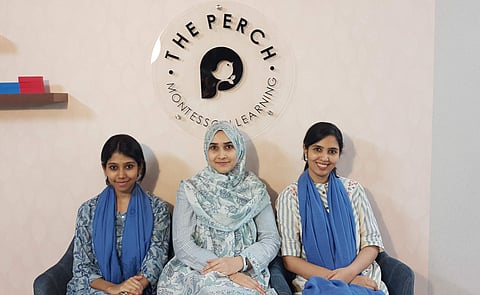

There's no denying that it's difficult to grab the attention of preschoolers. They are easily distracted. Especially in an online learning environment. So, how can these children learn during the pandemic that has shifted every aspect of education online? The Perch has a solution. With its online parent-assisted Montessori workshops, it is trying to give children the feel of a classroom right from their couch.
Founded by Asfia Ehsan, Suha Atheeq and Maria Akhtar in May this year, The Perch takes interactive learning to a whole new level. "The three of us are Montessori-trained and I have worked with a preschool for two years before we decided to launch the platform," says Asfia. The workshops are conducted for a total of 10 days, from Monday to Friday, for an hour every day and the next one is scheduled to begin on August 16. She says her motivation to launch online Montessori classes came from her desire to start her own preschool, which was side-tracked due to the pandemic.
So, how does online Montessori work? "Since the children can't come to school, we try to create those experiences with objects in their homes. The parents are asked to keep a few things ready before a class and the children have to perform activities using those household materials," explains Asfia, who is based out of Chennai. For example, Asfia would ask the parents to arrange bowls with drinks of different flavours for children to identify during a session on sensorial activities.
Asfia says that although Montessori education focuses on restricting screen time and focuses more on hands-on learning, this is the only way to keep the children occupied when they would have otherwise been idle. "It is imperative that children aged three and above are involved in developmental activities as maximum brain development happens during this age," says Asfia. "While we are eligible to train children up to the age of six, we only conduct classes for children aged two and a half years old to four and a half years old. It would be very difficult to do combined workshops otherwise because the learning level will be vastly different," explains Asfia.
Besides activities and exercise, the trio also focuses on storytelling, numbers, basic Math, art and rhymes. But how do they manage to hold the children's attention, especially online? "The first two days are a bit difficult as the children have never seen us before and they take time to accept us as teachers. But they also haven't seen someone their age for over a year and a half and here they can see a few more children like them even though on the screen," says Asfia. This, she says, helps a lot.
But there have been cases where the child had decided to walk off from the class. "In such cases, we never ask the parents to call them back. Instead, they are asked to sit and continue with the classes. After a while, when the child sees the parent continuing the class, they come and sit down," says Asfia. She adds that changing the activities frequently helps a lot as well.
The 10-day classes are priced at Rs 3,500 and children get a work bag, which contains some of the material that they would need for the classes, delivered to their homes. "We have students from all over India and even some NRI students," says Asfia. They hope to expand the course duration to three months in the future.
